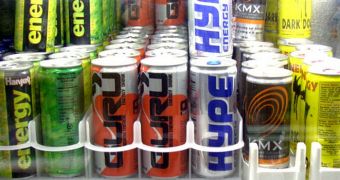A new investigation reveals that energy drinks such as those containing synthetic caffeine are devoid of healthy substances such as antioxidants and polyphenols.
Generally, natural coffee and tea contain copious amounts of these chemicals, which have countless beneficial effects on the human body.
These effects are apparently nonexistent in energy drinks, say researchers from the University of Illinois in Urbana-Champaign (UIUC), who conducted the new investigation.
The team says that energy drinks such as Full Throttle and Jolt do pack sufficiently-high concentrations of caffeine to deliver s noticeable punch. However, they definitely lag behind in added health benefits.
Details of the recent study were presented on August 26, at the fall meeting of the American Chemical Society (ACS), which was held in Boston, Massachusetts.
In order to compare the health benefits of tea and coffee to those provided by energy drinks, the science group compared caffeine extracted from green coffee and the South American yerba maté to synthetic caffeine, which is oftentimes made into energy drinks.
It was discovered that all three types of caffeine had the same effect on cells, preventing the accumulation of fat. The effect was recorded both in live animals and in lab cultures.
However, the main difference was that hot drinks brewed with both varieties of natural caffeine had very significant concentrations of polyphenols and antioxidants, whereas the synthetic variety had none of these chemicals.
The UIUC group was led by expert Melanie Heckman. She reveals that the way people can learn what type of caffeine they are consuming is by checking the labels of their energy drinks.
According to regulations set by the US Food and Drug Administration (FDA), the adding of caffeine needs to be listed on the label separately, if the substance is not included in natural sources such as coffee beans.
Antioxidants and polyphenols are extremely beneficial chemicals. They play a role in inhibiting the the oxidation of other molecules, which reduces the number of chemicals known as free radicals in the body.
These substances can trigger the onset of cascade chemical processes that promote the gradual destruction of cells, Science News reports.

 14 DAY TRIAL //
14 DAY TRIAL //